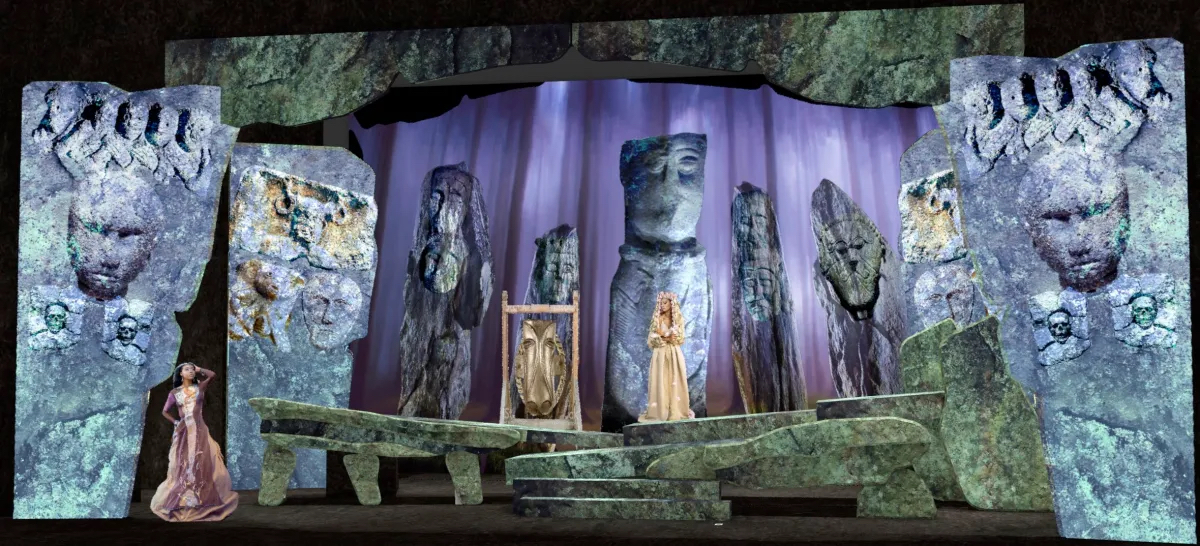Festival Opera launched its 2022 summer season a few weeks ago, with offerings including a free outdoor concert. But the company’s principal event for the season under general director Zachary Gordin was a fully staged production of Bellini’s “Norma.” Under the direction of Mark Foehringer and featuring soprano Shana Blake Hill in the title role of the 1831 bel canto masterwork, this “Norma” opened Friday in the Hofmann Theatre at Walnut Creek’s Lesher Center for the Arts.
If the production elements didn’t always cohere in the first of two performances continuing through Sunday, there was a sense of dramatic urgency — and one thrilling company debut — in the nearly three-hour opening night performance.
“Norma” is one of opera’s dramatic love triangles: The title character is a Druid priestess in Roman-occupied Gaul. She’s in a secret love affair with Pollione (Dane Suarez), the Roman proconsul. But Pollione has fallen for Norma’s close friend and ally, Adalgisa (Ashley Dixon).
Thrown together as rivals, Bellini’s music for the two women elevates the opera to the heights of searing intensity, with love of country — and the palpable threat to Norma’s two young sons — fueling the drama.
Friday’s opening performance got off to a bit of a slow start, as Oroveso — the chief Druid who also happens to be Norma’s father — outlined a plot for revolt against the Romans, and Pollione, confiding in Flavio, admitted his newfound passion for Adalgisa and his plan to take the young novice to Rome and marry her.

With Norma’s first entrance, the temperature began to rise. Hill, who sang the title role in Festival Opera’s excellent production of Carlisle Floyd’s “Susannah” a few seasons back, doesn’t overact, and she delivered her great Act I aria, “Casta diva,” with regal bearing and secure, vibrant tone. The soprano continued to meet the challenges of the title role throughout the performance, projecting the character’s inner turmoil in assured, well-modulated displays of deep feeling.
Still, Friday’s opening performance didn’t fully coalesce until the first entrance of Dixon. Singing the role of Adalgisa, the mezzo-soprano galvanized the proceedings; from her first entrance, outlining the emotions — shock, fear, the realization of danger — confronting her, she limned the character with impassioned, articulate vocalism.
Dixon, an alumna of San Francisco Opera’s Adler Fellowship program, went on to give a thrilling performance right to the end. Her first scene with Pollione (“Va crudelé”) was gripping, and Act I continued to proceed on a high from there; the first half’s finale, with Hill, Dixon and Suarez singing with unbridled intensity, was full of the pyrotechnics that opera lovers adore.
There was more excitement in Act II, bringing another gorgeous duet for Hill and Dixon, as Norma urges Adalgisa to rescue her sons from the coming crisis.
In addition to the principal roles, sung by Hill, Dixon, and Suarez, there were strong contributions from bass Kevin Thompson as Oroveso, tenor Marcus J. Paige as Flavio and mezzo-soprano Lily Bogas as the Druid nurse, Clotilde.
Foehringer’s staging, with designs by Peter Crompton and lighting by Matthew Antaky, didn’t always mesh. Sprawling across the Hofmann Theatre stage was a garish mash-up of runic stone carvings and dark video images of a giant tree with deep, gnarled roots that periodically became engulfed in flames. Marina Polakoff’s costumes ran the gamut, from a glitzy Act I gown for Norma that would have been at home in a Vegas revue, to the grubby priests’ robes that suggested Burning Man leftovers.
Conductor Bryan Nies made an inconsistent showing, imparting fervor to the big episodes, but occasionally letting the momentum lag. But Bruce Olstad’s Festival Opera Chorus made fine contributions as Druids, priests, virgins and warriors, especially in the opera’s moving finale.
This wasn’t an ideal “Norma,” and at times, it was hard to overlook the inconsistencies in production values. But Bellini’s score offers rewards in any performance, and Festival Opera’s certainly didn’t lack for fire.
The post Review: Ashley Dixon makes a thrilling Festival Opera debut in its less-than-ideal production of ‘Norma’ appeared first on Local News Matters.
